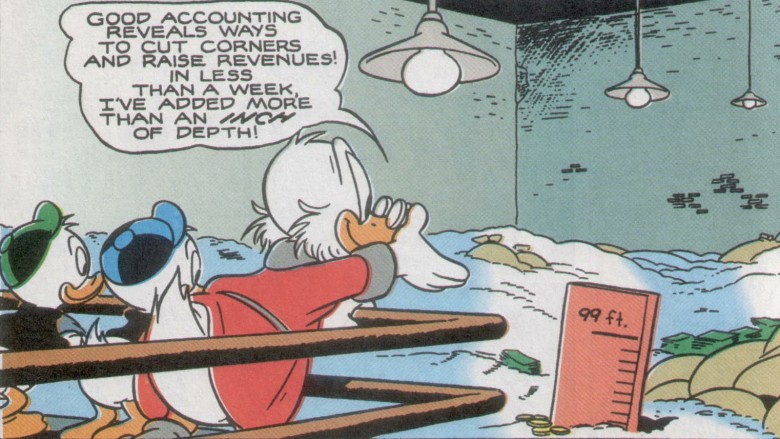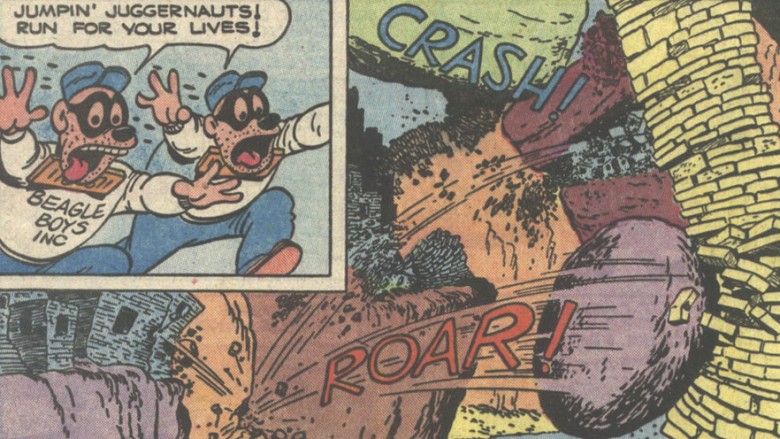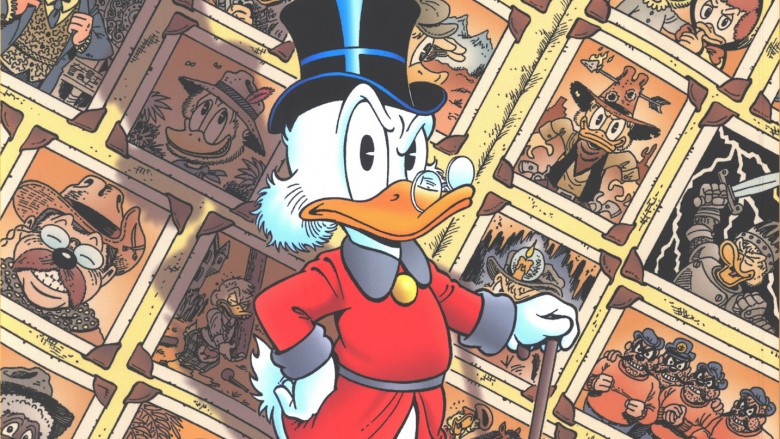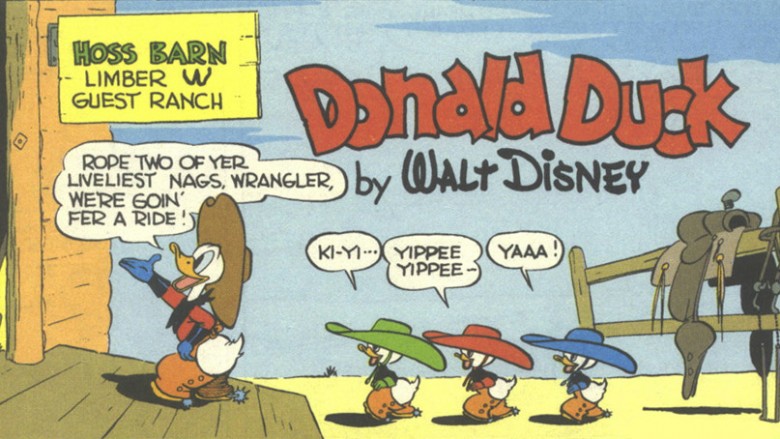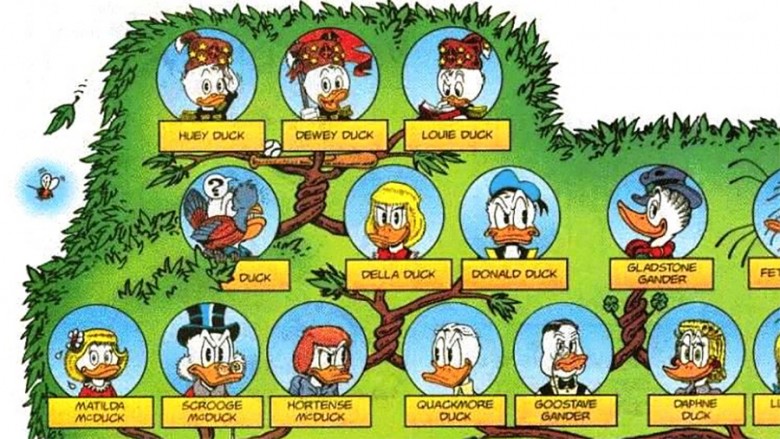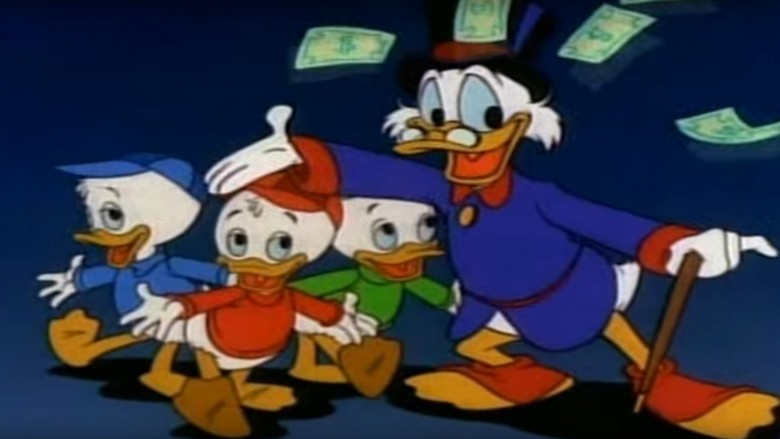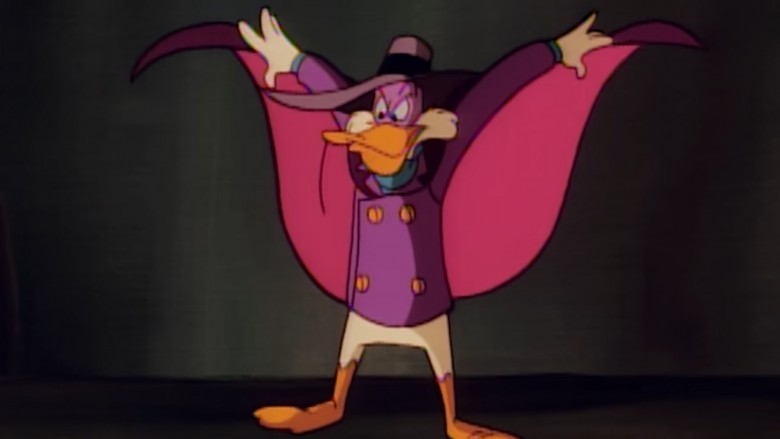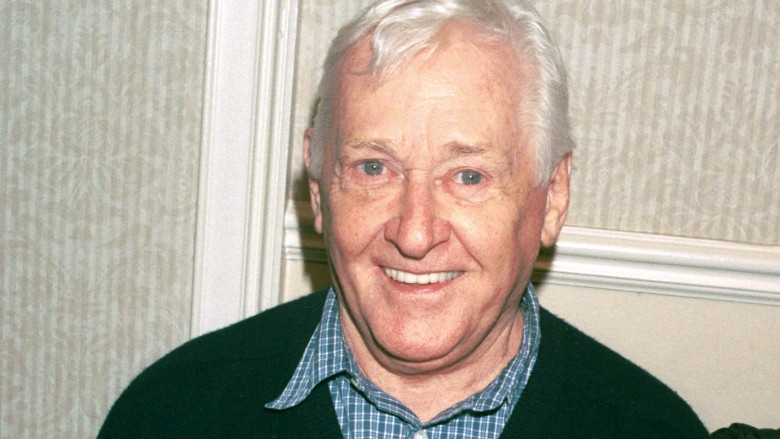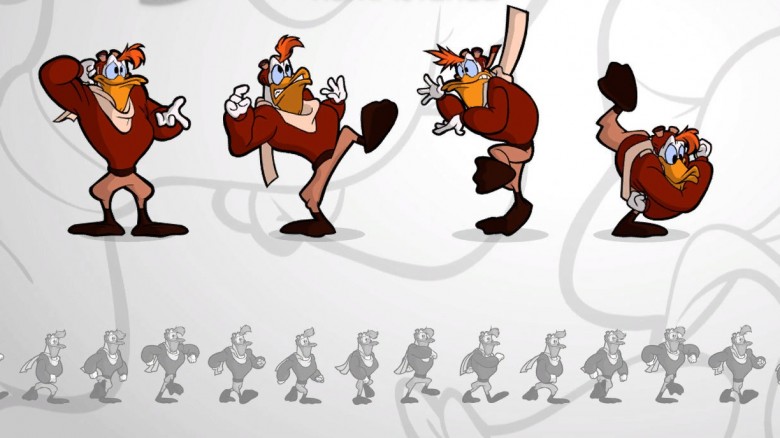The Untold Truth Of DuckTales
We may receive a commission on purchases made from links.
Race cars. Lasers. Airplanes. Whether the citizens of Duckburg are solving mysteries or rewriting history, life is always busy on DuckTales, and with the 2017 revival going full steam ahead, it doesn't look like things will be slowing down for Uncle Scrooge, his three nephews, and his pilot, Launchpad McQuack, anytime soon.
But DuckTales is more than just a simple kids' cartoon. Throughout hundreds of comics, a series of well-received video games, and two separate animated series, Clan McDuck and its various nemeses have entertained and delighted fans of all ages for decades—and racked up a number of interesting stories along the way. Just remember: it's not pony tails. It's not cottontails. It's DuckTales. Woo-ooo!
DuckTales is based on some of the best-selling comics in the world
In America, superheroes dominate the comic book industry. In the rest of the world—especially Europe—that's not the case. According to sales figures from 2005, Disney-related comics comprise roughly 50% of all of the (non-manga) comics published around the world, thanks largely to series headlined by Mickey Mouse and Donald Duck.
A lot of Disney's popularity can be traced back to a single man: Carl Barks. Known for years as "the good duck artist"—for a long time, the only artist credited on Disney comics was Walt Disney himself—Barks wrote and drew around 500 comics starring Donald, his miserly Uncle Scrooge McDuck, and his three nephews, Huey, Dewey, and Louie. Some of these were short, 10-page comedy strips that appeared in Walt Disney's Comics & Stories. Others were longer, more straightforward adventure stories, most of which appeared in Barks' quarterly Uncle Scrooge series—which just happened to be the best-selling comic book of the 1960s.
Along the way, Barks transformed Donald from a loudmouthed troublemaker into a credible action hero, created the town of Duckburg and most of its most notable residents (including Scrooge, the dastardly Beagle Boys, Scrooge's rival Flintheart Glomgold, and the evil sorceress Magica De Spell), and crafted an elaborate duck-related continuity that's still the basis for Donald Duck stories today.
When DuckTales debuted in 1987, it didn't just use Barks' detailed setting and well-liked characters, either. A number of Barks' comic book stories, including "Land Beneath the Ground" and "The Golden Fleecing," were adapted directly into animated form (and ultimately collected in Gemstone Publishing's multi-volume Carl Barks' Greatest Ducktales Stories series).
The original duck comics were a big influence on George Lucas and Raiders of the Lost Ark
Carl Barks' comics didn't just provide the basis for DuckTales—they're also responsible for a some other classic franchises that you've probably heard of. For example, George Lucas—y'know, the guy who created that whole Star Wars thing—wrote the foreward for Celestial Arts' Carl Barks compilation, Walt Disney's Uncle Scrooge McDuck: His Life & Times, and says that Barks' duck comics are some of his favorite stories of all time.
In the opening, Lucas lauds Barks' vast imagination and his "unique and special and bizarre" ideas, and heaps praise on Barks' straightforward but emotionally deep stories, which he says are full of "ingenuity, integrity, determination, a kind of benign avarice, boldness, a love of adventure, and a sense of humor." Remind you of any scruffy-looking nerf herders you know?
But Lucas' affection for Carl Barks and Duckburg doesn't stop there—the opening sequence in Raiders of the Lost Ark, in which a misplaced idol triggers a death-trap starring a giant boulder, was lifted from Barks' "The Seven Cities of Cibola." Just don't call it a rip-off: according to Edward Summer, who put together the Celestial Arts compilation, Lucas designed the scene as an intentional homage to one of his favorite artists.
A few years later, the DuckTales crew repaid the favor—just put DuckTales' original logo next to Raiders of the Lost Ark's and you'll see what we mean.
Barks' successor has a strained relationship with DuckTales
Technically, Barks retired in 1966, although he contributed a handful of stories to various comic books throughout the '70s. Thankfully for fans, another talented cartoonist was ready to take his place. In 1986, Don Rosa called the editor at Gladstone Publishing, which was publishing Disney comics at the time, and more or less demanded the Uncle Scrooge job. After submitting a 26-page Harvey-award winning story called "The Son of the Sun," he got it, and Rosa spent the next two decades writing and drawing Scrooge's adventures for various publishers.
Rosa's work immediately caught on with Barks' fans. In 1991, Rosa penned The Life and Times of Scrooge McDuck, a meticulously researched 12-issue epic that draws heavily on Barks' original comics to tell the story of Scrooge's rise to fame. It was a huge hit, and scored Rosa the 1995 Eisner Award—basically, the comic book-equivalent of an Oscar—for Best Serialized Story (he'd win again in 1997, picking up the award for Writer and Artist, Humor).
Given that DuckTales draws so heavily on Barks' work, you'd think that Rosa would be a big fan, right? Not so fast. While Rosa claims that he likes the cartoon—he calls it "the best kids animated TV show of the '80s"—he seems pretty frustrated that people tend to link the comics and the show. In fact, he even puts a sign on his table at conventions saying as much.
"People say, 'Oh, DuckTales.' I'll say, no, and explain it to them.... It's pathetic that you have to explain that to Americans that these characters, which are the world's most popular comic book characters—and all they know of it is a kiddie TV show," Rosa says. "I try to tell people that Superfriends is to Superman and Batman what DuckTales is to Carl Barks' actual Uncle Scrooge stuff."
Basically? It's complicated.
There's a very good reason why Donald Duck doesn't star in DuckTales
Uncle Scrooge was the breakout star from Carl Barks' legendary comic book run, but Donald Duck did pretty well for himself, too. "Barks redesigned Donald Duck when he was hired to produce comic books for [comic book publisher] Dell about this actor who appeared in Disney's seven-minute animated cartoons," Rosa has explained. "With Disney, Donald Duck had no background, he had no history, he had no consistent personality. Dell had to assign somebody to create an entire character out of this name."
And yet, despite being one of the main characters in Barks' adventure stories—not to mention the glue that holds together the ducks' family tree (more on that later)—DuckTales shipped Donald off to the Navy as soon as possible, leaving Huey, Dewey, and Louie in Scrooge's care.
According to DuckTales story editor Tad Stones, Disney made that decision for two reasons. For one, Donald is one of the company's most popular and recognizable characters, and executives were worried that featuring him on a daily television might lead to overexposure. But there's another, more practical reason, too. Donald's high, scratchy voice is fine in short bursts, but it's hard to understand. Producers decided that including Donald part of DuckTales' main cast would've made the stories very, very confusing. We'll see just how bad it can be—Donald has joined the crew as a regular in the 2017 DuckTales reboot, in which he's played by his longtime voice actor Tony Anselmo.
Nobody knows who Huey, Dewey, and Louie's father is
As you'd expect, over the course of more than 600 stories, the Duck dynasty has gotten very, very complicated—and yet, one key member of the clan has never been unmasked. We know that Huey, Dewey, and Louie's mother is Della Duck (or Thella Duck—this is one of the few areas where Barks and Rosa seem to disagree), who also happens to be Donald's twin sister, making Uncle Scrooge the triplets' great uncle. However, the identity of their father—and Della's husband—remains a mystery to this day.
Barks and Rosa avoided revealing Huey, Dewey, and Louie's father's real identity in a number of ways. Barks simply declined to include the triplets' father in any of his stories. However, In the '50s, a cartoonist named Mark Worden created an illustrated version of Barks' complicated Duck Family Tree, which featured the father's face but left the mystery duck's name blank (duck scholars note that the face looks a lot like an extra that appeared in Barks' "Double Masquerade," right down to the creepy human-like ears).
Rosa's approach is a little more coy. When he released his fully-illustrated version of Donald Duck's family tree in 1993, Rosa covered the duck's face and name with leaves and a wayward bird (literally, the picture is of a tree). In prints that Rosa sells at conventions, he leaves the space for the father's name blank, and fills it in with the name of whoever's buying the art—which led many people on the Internet to assume that the father's name was the very un-duck-like Jamie Hawkins after a scan of one of the family trees appeared online.
DuckTales kickstarted the late '80s/early '90s syndicated cartoon market
Do you have fond memories of cartoons like Chip 'n Dale's Rescue Rangers, TaleSpin, and Darkwing Duck? What about non-Disney cartoons like Tiny Toon Adventures and Batman: The Animated Series? If those names get your nostalgia flowing, you've got DuckTales to thank. Not only was DuckTales a big success for Disney, eventually leading to the popular Disney Afternoon animation block, but it started a big push for syndicated afternoon cartoons that lasted well into the mid-'90s.
In 1984, Michael Eisner took over as head of Disney, and in addition to revitalizing the studio's flagging animation department—once considered the company's crown jewel—Eisner and his compatriots decided to conquer the world of television animation. They started by producing two series, The Adventures of the Gummi Bears (loosely inspired by the classic kids' candy) and The Wuzzles, a collaboration with the toy-maker Hasbro.
But according to historians, the lack of control that Disney had over both series (as Saturday morning cartoons, production runs were limited, and the shows could be cancelled at any time by the networks they aired on) led the company to consider another approach. A syndicated daily cartoon would give Disney more say in what happened to their show and opened up a brand new market. It would also cost a lot of money.
Thankfully, money is something Disney had. In 1987, DuckTales made its two-hour debut, and proved an instant and immediate hit. Disney went on to air the rest of DuckTales' 65-episode season (eventually, Disney would add more, until the series topped out at an even 100) and rushed Rescue Rangers into development. Other studios took note, too. Warner Bros. launched Tiny Toon Adventures in 1990, while Fox created the Fox Kids programming block, which eventually brought cartoons like Batman, X-Men, Bobby's World, and a number of other original and licensed titles to the airwaves.
DuckTales was the first American cartoon broadcast in Russia after the fall of the Soviet Union
DuckTales wasn't just a hit in the United States. Kids all over the world loved it, too, even if it was known by wildly different names. In Japan, the series was called Naughty Ducks Dreams Adventure. In Romania, it was called Stories with Mac-Mac. In Hungary, there's even a term—"Kacsamesék generáció"—that translates to "the DuckTales generation," referring to kids who were born in the early-to-mid '80s, many of whom were first exposed to politics when an episode of the cartoon was interrupted with the news that Jozsef Antall, the country's first democratically elected leader after the Cold War, had passed away.
But DuckTales' biggest international legacy probably comes courtesy of Russia, where it (along with Chip 'n Dale's Rescue Rangers) was the very first American cartoon broadcast after the Cold War. According to historians, Disney's movies, animated shorts, and comic books were popular in the Soviet Union during the communist era, making the region a natural target for Disney's marketing team once the Iron Curtain fell.
Thanks to its nostalgic roots, some reports claim DuckTales' iconic theme song is very popular at dance clubs around Russia. After all, the song is just as catchy today as it was back in the '80s, and it's a big hit in its Cantonese, Danish, Swedish, and Hindi iterations, too (thankfully, "Woo-ooo" is the same in every language).
Darkwing Duck was inspired by two DuckTales episodes
One of the many Disney-themed cartoons that emerged after DuckTales' success was Darkwing Duck, a noir-tinged superhero series featuring a Bruce Wayne-like protagonist named Drake Mallard and his sidekick, Uncle Scrooge's former pilot Launchpad McQuack.
Obviously, Launchpad's featured role in both series ties DuckTales and Darkwing Duck together, but the two shows have a much deeper connection. When Disney asked Tad Stones, who started on Gummi Bears, worked on DuckTales, and created Chip 'n Dale's Rescue Rangers, to pitch a new series for the Disney Afternoon, he went back to an old DuckTales episode, "Double-O-Duck." In "Double-O-Duck," Launchpad goes undercover as a secret agent. Stones tried to spin that out into its own series, but couldn't turn it into more than a basic spy parody (it didn't help that the "Double-O" designation was created by James Bond author Ian Fleming and couldn't be used in the title).
To give the series a little more depth, Stones fused his initial concept with Batman, The Shadow, and his own experiences as a parent. The lead character's costume was inspired by the DuckTales episode "The Masked Mallard," in which Scrooge fights crime as an urban vigilante, Launchpad was demoted from hero to sidekick, and Darkwing Duck was born. Just don't call it a spinoff. While Darkwing Duck might have a lot of DuckTales in its DNA (in addition to shared characters like Launchpad and Gizmoduck), Stones argues that Darkwing Duck and DuckTales are set in alternate realities, and that there's no in-universe link between the two shows.
Alan Young played Uncle Scrooge until he was 94
Scrooge McDuck isn't a young man—er, waterfowl—and neither was Alan Young, the man who gave Scrooge his distinctive Scottish brogue. When DuckTales debuted in 1987, Young was already 67, and had a filmography a mile long. In the '40s, Young hosted a sketch comedy program called The Alan Young Show, which began on radio before moving to television in the '50s. He also played Wilbur Post, the human lead on Mr. Ed, one of the biggest TV hits of the '60s and among the most popular kids' shows ever made.
And yet, while Scrooge McDuck might not be Young's most iconic role (Mr. Ed is a pretty tough act to follow), it was certainly his longest. DuckTales ended in 1990, but Young's association with Scrooge didn't. Over the years, Young reprised his second-biggest role a number of times in various Disney projects, including 2002's House of Mouse, the direct-to-video animated special Mickey's Around the World in 80 Days, and Square Enix's Final Fantasy and Disney mash-up Kingdom Hearts: Birth by Sleep.
In fact, Young was well into his 90s when he made his final appearance as Scrooge, reprising the role one last time for the high-definition remake of the classic DuckTales video game. According to director Austin Ivansmith, Young's swan song almost didn't happen. The staff at WayForward wasn't planning to include voice acting in the updated game's cutscenes (the original didn't have any, after all), but the developers changed their minds once Disney told them that DuckTales' cast was ready to return. "You don't say no to that," Ivansmith says. "Oh, Alan Young wants to play Scrooge? Yes, we will write a bigger script, write more, and bring him to life."
The actor who played Launchpad isn't happy about being replaced
DuckTales has a long, complex legacy, and it isn't over yet. Summer 2017's DuckTales reboot sends Scrooge, the triplets, and the rest on a whole new set of adventures—and brings a brand new voice cast, too.
Instead of Alan Young, who died in 2016 at age 96, Doctor Who and Jessica Jones star David Tennant voices Scrooge McDuck. Huey, Dewey, and Louie are played by Community's Dani Pudi, Ben Schwartz (Parks and Recreation, House of Lies), and Saturday Night Live cast member Bobby Moynihan, respectively. Kate Micucci, one half of Garfunkel and Oates, is Webby Vanderquack (who's been upgraded from a bit player to a regular cast member), while comedian Beck Bennett takes over as the pilot Launchpad McQuack.
That's an amazing cast, but at least one DuckTales veteran isn't impressed. In a Facebook post, Terry McGovern—the original Launchpad—said missing out on the reboot made him "heartsick." Shortly after Disney announced the new DuckTales series, McGovern claimed he received a phone call from a woman at the studio, but wasn't pleased by what she had to say. "When she first introduced herself on the phone, that she was calling on behalf of DuckTales, I thought, WOW! THE BAND'S GETTING BACK TOGETHER!" McGovern wrote. "Alas, it's going to be a new band.... This is not a life or death situation, but it feels like one."
Thankfully, despite his disappointment, McGovern displayed a sense of humor about the whole thing. "I haven't told Launchpad himself yet. He's in the garage tinkering with the Thunderquack. I just don't have the heart to tell him," McGovern quipped, adding, "And thanks for your sympathy. I wish the new cast well."

